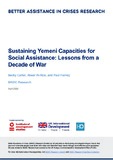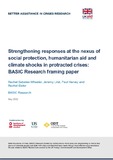BASIC Research
Browse by
Better Assistance in Crises (BASIC) Research aims to inform policy and programming on how to help poor and vulnerable people cope better with crises and meet their basic needs through more effective social assistance in contexts of recurrent shocks, climate crises, humanitarian crises, protracted conflict and forced displacement.
Recent Submissions
-
Targeting in Protracted Crises: Nigeria Case Study
(Institute of Development Studies, 2024-06-04)This country case study focuses on Nigeria and the specific challenge of conflict, violence, and insecurity. Using four waves of General Household Survey data covering the period 2010 to 2019, we analyse trends in poverty, ... -
How Can Aid Actors Support Yemeni Capacities for Social Assistance?
(Institute of Development Studies, 2024-05-29)Much of Yemen’s population needs basic assistance to avoid famine. As well as providing food and cash-based support during a decade of war, international aid actors have sustained and strengthened the capacities of local ... -
Social Protection in Nigeria: Analysing Capacities
(Institute of Development Studies, 2024-03-09)This report describes findings of an analysis of capacities to deliver social protection in Nigeria. It focuses specifically on generating findings that will be useful to situations of protracted crisis, such as displacement ... -
Conflict Disruptions to Social Assistance in a Multi-Hazard Context: Assessing Responses to the Northern Ethiopia Crisis (2020–22)
(Institute of Development Studies, 2024-05-28)This paper focuses on both the responsiveness and resilience of Ethiopia’s Productive Safety Net Programme (PSNP) to large-scale conflict shocks. Focusing on how PSNP systems and implementation responded during the 2020–22 ... -
Conflict, Displacement, and Social Assistance in Three Districts of Ethiopia
(Institute of Development Studies, 2024-05-28)In the context of recurrent drought shocks and other climate stresses, and in the aftermath of conflict that has affected different parts of Ethiopia, the country is struggling to address a sizeable humanitarian challenge ... -
Sustaining Yemeni Capacities for Social Assistance: Lessons From a Decade of War
(Institute of Development Studies, 2024-05-01)Yemen has sometimes been held up as an impressive example of how existing social protection systems and capacities can be maintained and supported even during a prolonged war. While providing support to meet immediate ... -
Strengthening Responses at the Nexus of Social Protection, Humanitarian Aid and Climate Shocks in Protracted Crises: BASIC Research Framing Paper
(Institute of Development Studies, 2022-05-24)The Better Assistance in Crises (BASIC) Research programme seeks to better understand how to strengthen routine social assistance in the most difficult protracted crises – places where compounding shocks such as climate ...







